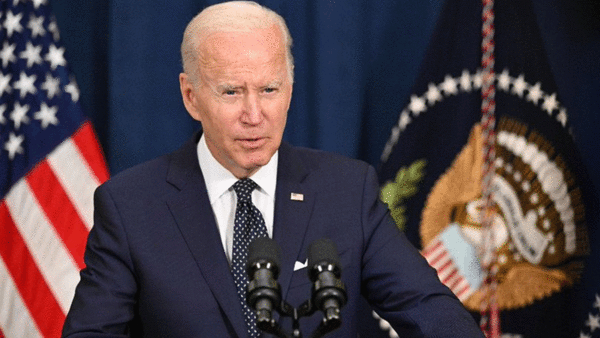ARAB AND WORLD
Sat 03 Jun 2023 11:45 am - Jerusalem Time
Biden will sign a measure that allows his country to avoid a "catastrophic" default on the debt
President Joe Biden announced Friday that he will sign Saturday a measure authorizing an increase in US government borrowing, removing the "catastrophic" threat of default that has loomed over the world's largest economy.
"I will sign tomorrow," Biden said, addressing the nation from the Oval Office, adding, "Nothing would be more irresponsible and nothing would be more catastrophic" than a default.
US senators voted in favor of raising the federal debt ceiling on Thursday, at the end of painstaking negotiations to ward off the specter of a catastrophic default, just four days before the deadline set by the Treasury Department.
Economists have warned that the United States may not be able to pay its bills by Monday, leaving no room for delay in implementing the "Fiscal Responsibility Act" that extends government borrowing authority to 2024 while cutting federal spending.
And the Senate passed the measure that Biden reached with the Republicans by a comfortable majority (63 to 36 votes), the day after its approval in the House of Representatives.
"Nobody gets everything they want in negotiations, but rest assured that this bipartisan agreement is a huge victory for our economy and the American people," Biden said in a statement posted on social media.
In turn, the leader of the Democratic majority in the Senate, Chuck Schumer, stressed that the country could now "breathe a sigh of relief" after avoiding a "catastrophic" economic collapse.
"But after the many difficulties it took to get to this point, it is good for this country that the two parties have finally come to an agreement in order to avoid default," he added.
The bill, which will now be submitted to Biden for his signature in order to become law, put an end to the debates between the leaders and members of the two parties, which continued to threaten its approval in light of disagreements that continued until the last moments over the details.
Democratic leaders spent months focusing on the chaos that the first default in history would have caused, including the loss of millions of jobs and $15 trillion in family wealth, as well as rising mortgage costs and other forms of leverage.
The events came late Thursday night after a series of failed votes on amendments demanded mainly by Republicans, who at one point threatened to disrupt the process, to continue through the weekend.
Senators offered 11 amendments to the 99-page text, as many opposed funding levels for projects important to them -- from border control and trade with China to taxation and the environment. Consequently, each of these issues called for a vote.
At one point, defense hardliners were unhappy with the Pentagon's spending cap.
In the end, they accepted its passage after obtaining a pledge to a separate law allocating cash funds to defend Ukraine in the face of the Russian invasion, support US national security interests in the Middle East, and in the face of increasing Chinese hostile moves towards Taiwan.
"As it stands, this bill puts our military at a disadvantage," said South Carolina Republican Senator Lindsey Graham. "The most significant money we budget each year is that devoted to protecting and defending the United States and our interests."
The United States spends more money than it collects in taxes, so it borrows money by issuing government bonds, the most reliable investments in the world.
Almost 80 years ago, Representatives put an end to the federal debt that could be accumulated.
The cap has been raised more than 100 times since to allow the government to meet its spending commitments, usually without fanfare and with the support of Democrats and Republicans, and now stands at about $31.5 trillion.
The two parties believe that raising the debt ceiling is poisoning the political atmosphere, although they acknowledge that failure to do so will plunge the US economy into recession and lead to turmoil in global markets with the government's inability to pay its debts.
Republicans hoped to use the extension as a weapon against what they see as excessive spending by the Democrats ahead of the 2024 presidential elections, even though the debt ceiling increase covers only commitments already made by both parties.
Republican House Speaker Kevin McCarthy described the agreement, which he spent weeks negotiating, as a major victory for conservatives, although it faced criticism from the hard right, who saw it as too concessional in terms of spending cuts.
Short of one vote out of the 150 he pledged to win in the House (two-thirds of his caucus) as he battled a right-wing rebellion and needed Democrats' help to move the bill to the Senate.
As for Biden, he believes that the vote constitutes an important victory for him, as he succeeded in protecting almost all of his internal priorities from the large spending cuts that the Republicans threatened.
"This legislation protects the full confidence and credibility of the United States and preserves our leadership role financially, which is essential to our economic growth and stability," said Treasury Secretary Janet Yellen.






Share your opinion
Biden will sign a measure that allows his country to avoid a "catastrophic" default on the debt